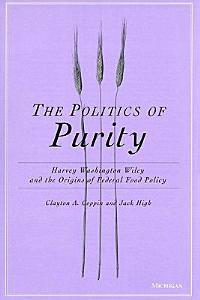Counterprogramming
- 09.11.19
- Education, Uncategorized, education
- No Comments
As I mentioned last year, Anthony now attends a private high school that suits his intellect and his interests and immerses him in an environment filled with kids much like him. We’re very happy with the experience so far–the kids want to learn, the teachers want to help them learn, and the facilities are top-notch.

But nothing is perfect. The teacher in Anthony’s Genealogy elective denounced capitalism out of the blue. Other teachers voice distrust in voluntary markets and great faith in coercive government over issues that have my son rolling his eyes.
The first week of classes, the kids were assigned The Poison Squad, a 2018 book that purports to tell “the dramatic true story of how food was made safe in the United States and the heroes, led by the inimitable Dr. Harvey Washington Wiley, who fought for change.” The work by lefty author Deborah Blum has received buzz from media corners that are usually supportive of activist government. But it’s hardly the only book about Wiley, nor is it the definitive one. That might be 1999’s scholarly The Politics of Purity: Harvey Washington Wiley and the Origins of Federal Food Policy, which said of Wiley, “Instead of a champion of purity, we see him working hand in glove with firms that benefited from his enforcement of the pure food law.”
Unfortunately, the scholarly effort by Clayton Anderson Coppin and Jack High costs about $80 a copy–a bit rich for expanding the perspective of my son and his classmates. So I printed out a couple of key pages from Google Books to offer a different point of view. Then I grabbed, “Wiley and the Whiskey Industry: Strategic Behavior in the Passage of the Pure Food Act,” a 1988 paper by the same authors (the actual paper can be found through Sci Hub, which is your friend). Among the tidbits from that paper is this gem:
The actions of Wiley and the whiskey industry during 1903-6 had little to do with the public interest. Wiley’s efforts for “pure” whiskey were, if anything, harmful to the consumer, because he endorsed the more poisonous product.
Do you have to accept Coppin’s and High’s take as the “correct” one over Blum’s hagiography? No, but isn’t it nice to have another perspective on a key figure in setting regulatory policies with which we still live? Anthony is now sharing this information with his classmates, leading one to conclude of Wiley, “oh, so he was corrupt.”
A little counterprogramming is not a bad thing.
No Comments »
RSS feed for comments on this post. TrackBack URL